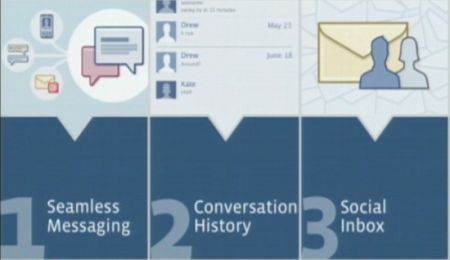Convergence is sweeping the social networking world. Facebook recently implemented an across-the-board consolidation of all its messaging services, bringing them all together within one page stream. These are now accessible through an all-encompassing “Messages” link on our profile navigation pane where there was formerly a link labelled “Inbox”. Mail, text messaging, chat, and “other real-time conversation tools” are now supposedly to be managed from one “converged” stream.

Already, the experience of using the conventional email-like messaging facility within Facebook (for Facebook user-to-user emailing) is virtually indistinguishable to chatting (which currently appears as a separate service accessible from the lower right corner of the browser). Even prior to the consolidation, messages appear within seconds of receipt if the user happened to be viewing the email thread to which that message was sent. This was and is now the standard feel of Facebook messaging whether this activity is done on (the former) Inbox facility or commenting on posts made through Facebook Groups.
| SUPPORT INDEPENDENT SOCIAL COMMENTARY! Subscribe to our Substack community GRP Insider to receive by email our in-depth free weekly newsletter. Subscribe to our Substack newsletter, GRP Insider! Learn more |
The conventional Chat facility is modelled after first generation instant messaging (IM) apps like those provided by Yahoo and Skype. With mail-type message threads in Facebook now behaving in real-time, the old chat service is all but redundant.
Within Facebook, differentiating chat and “email” is now quite tricky and this is evident in how I struggle with terminology in the last three paragraphs above. Is it still email when the thread behaves in real-time like chat? Hmmm….

The final piece of functionality that will bring Facebook squarely into the territory of the big and the traditional is the launch of [your-user-name]@Facebook.com. Careful not to look too threatening to traditional Web-based email service providers like Microsoft’s Hotmail, Yahoo and Google’s Gmail, Facebook founder Mark Zuckerberg chose his words carefully…
“It is true that people will be able to have facebook.com email addresses, but this is not email,” he said at an event in downtown San Francisco. “It handles email.”
Mr Zuckerberg dismissed reports referring to the messaging system as a “Gmail killer” aimed at the heart of free web-based email services from Google and similar services from Yahoo! and Microsoft.
“We don’t expect anyone to wake up tomorrow and say ‘I’m going to shut down my Yahoo Mail or Gmail account,'” he said.
Last time I logged onto Facebook and checked my messages there, I was given the option (or more appropriately prompted) to register for a [me]@Facebook.com email address, and I thought “not another email account to manage!“. So I declined. For now. Perhaps there too in me is this feeling that Facebook is becoming the Borg — that alien species in the Star Trek: Next Generation franchise that “assimilates” hapless organisms into its “collective” being.
In the last couple of decades, digital computing and telecommunications technology had underinned the convergence of what were once very distinct devices and media — video and audio recording storage and distribution, telephony, and written correspondence — all of which can now be done within a single device (like a personal computer or mobile phone). Today, Facebook is seeing through this generation’s next wave of convergence at the application layer. Quite possibly, as the new labels on our Facebook interfaces now imply, “messaging” will be the new all-encompassing channel and the concepts of “email” and “chat” will cease to exist as distinct concepts.
- This latest Filipino-style ‘anti-corruption’ circus proves that the Philippines needs a serious reboot - November 16, 2025
- Filipinos literal sitting ducks as wind and floods from natural tropical typhoons amplified by years of neglect bear down - November 9, 2025
- Rally NA NAMAN??? - September 20, 2025
The Information Technology has grown in leaps and bounds, for a short amount of time…it will continue to change our lives; our politics; and as our social media…